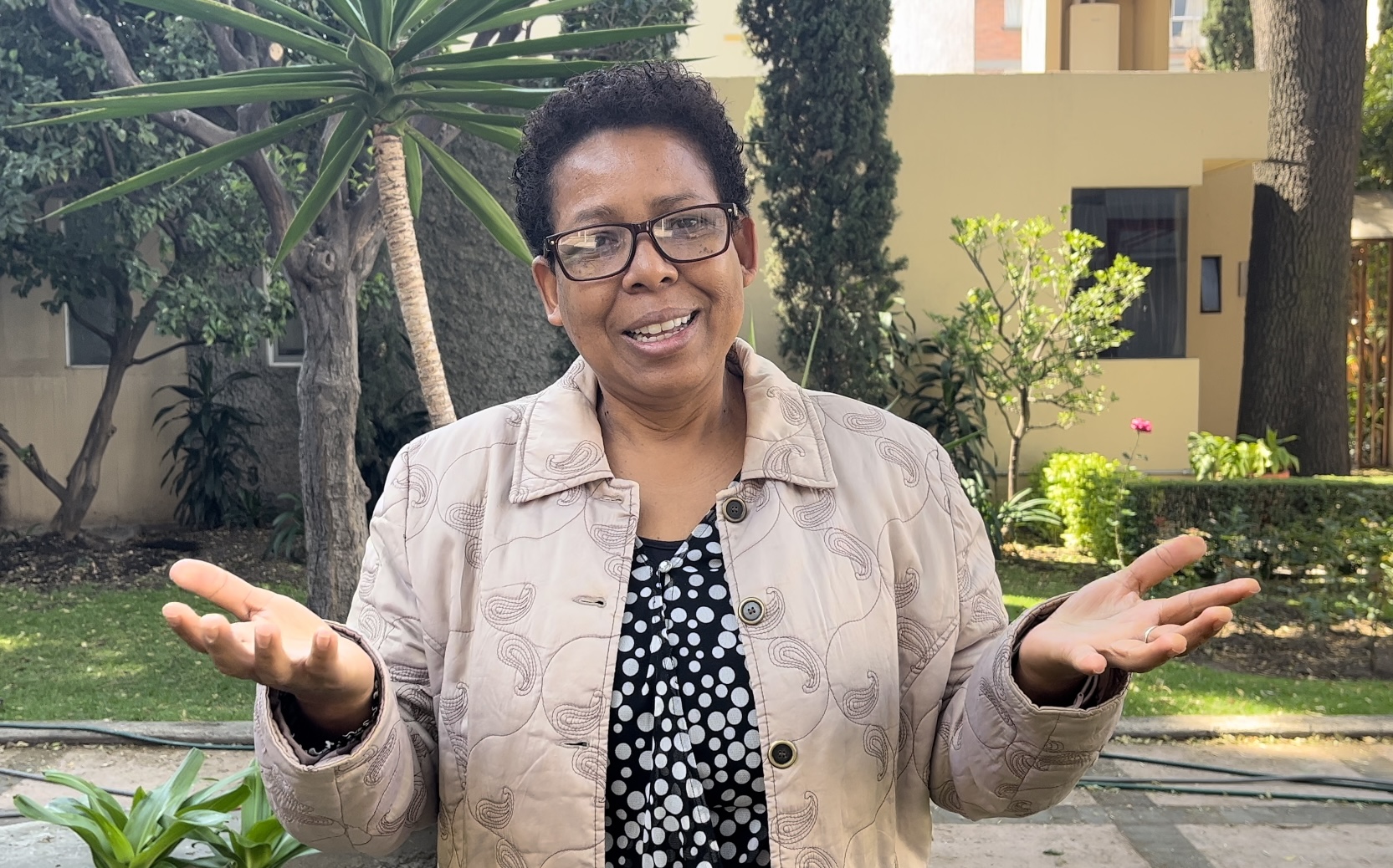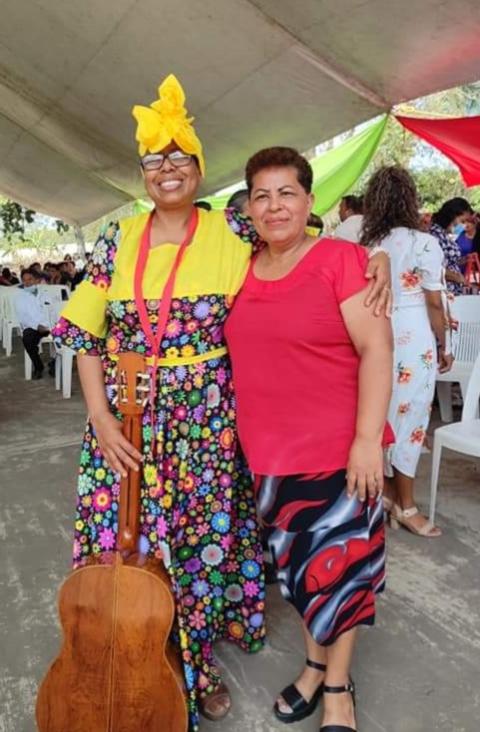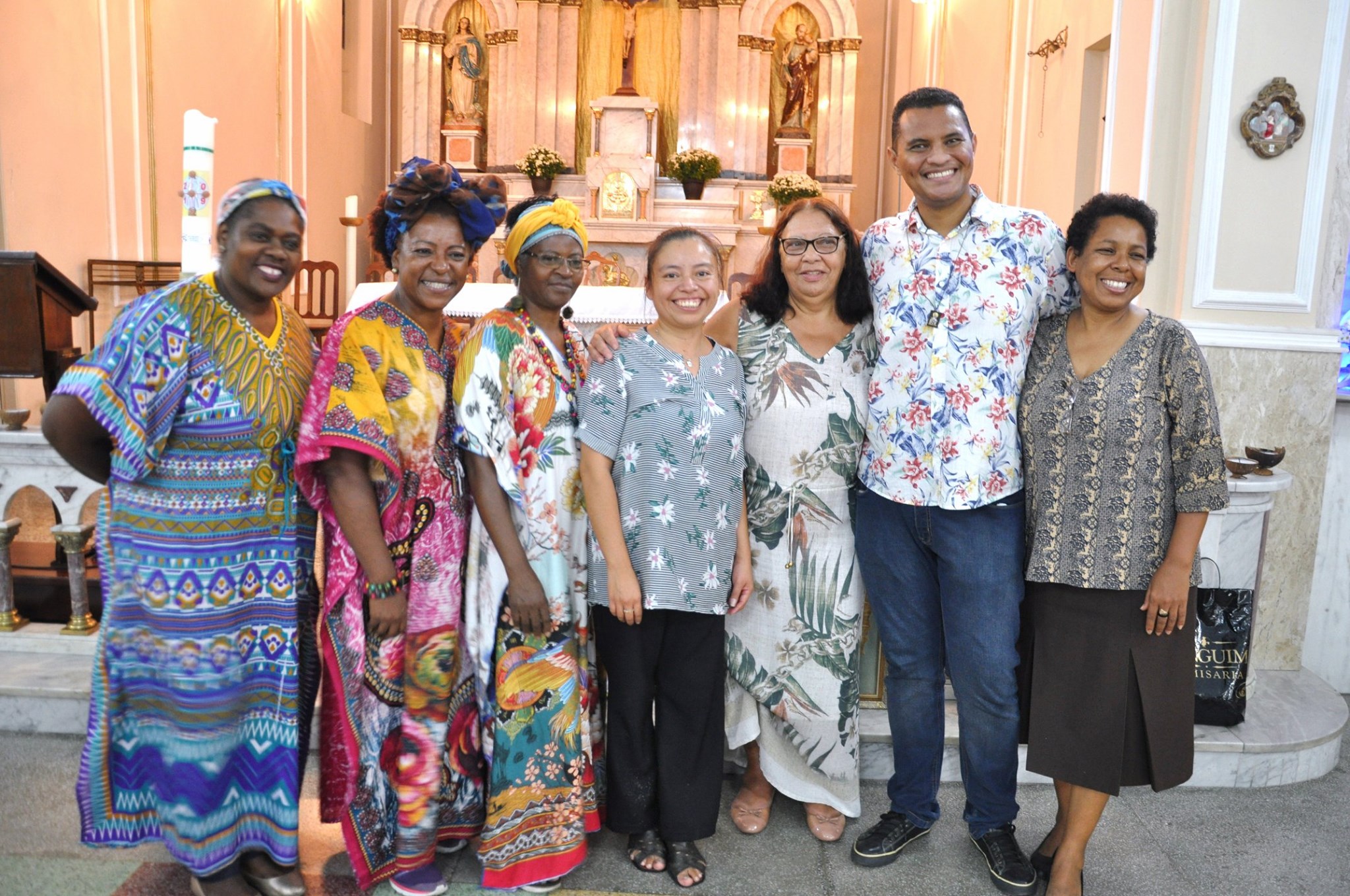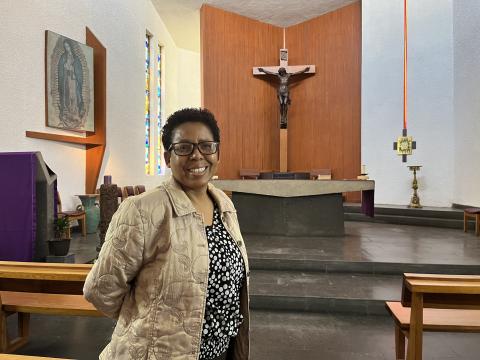
Sr. Ruperta Palacios Silva in the garden of the National Center for Social Ministry of the Episcopal Conference of Mexico in Mexico City (Luis Donaldo Gonzalez)
An Afro Mexican from Oaxaca, Sr. Ruperta Palacios Silva knows firsthand the faith and social issues of communities of African descent in Latin America and the Caribbean.
"I know what it is to be and live as an Afro," said the member of the Missionary Carmelites of St. Teresa, who coordinates the continent's Afro-descendant ministry under the Latin American and Caribbean Conference of Catholic Bishops (CELAM).
"I know what it is to remain silent in the face of racist attitudes, to move forward with bigger projects on behalf of my brothers and sisters. I am an Afro Mexican woman with all that that entails."
Palacios describes the ministry as the "church's action that animates, accompanies, promotes, and evangelizes Afro descendants. We work so that Afro descendants reaffirm their dignity as sons and daughters of God from their own identity, culture, and faith."
Today, more than 134 million Latin Americans identify as people of African descent. According to 2017 data from the Economic Commission for Latin America and the Caribbean, Brazil is the country with the highest Afro-descendant heritage, almost half its population; Cuba occupies the second place, with 34% of its population. (In Palacios' home country of Mexico, more than 2.5 million people identify as Afro Mexican.)
In addition to working with Afro Mexican communities on the coast of Oaxaca and Guerrero, Palacios also spent about 10 years working in Afro ministry in Rio de Janeiro.
Since February, Palacios has worked as coordinator of the Ministry of Indigenous Peoples and Afro-Mexicans of the Mexican conference of Catholic bishops, overseeing the Afro Mexican section, specifically.
"This is the mission that God is asking of me," she said to Global Sisters Report. "This is the mission that I am passionate about, and that makes me live my vocation."
Carmelite sisters have prioritized their work with the mixtecos, a native people of the coast of Oaxaca, since 1960, when they founded the Casa Misión Santa Teresita (St. Teresita Mission Home). Two decades later, this center included the accompaniment of Afro Mexican communities into their ministry.
"I know what it is to remain silent in the face of racist attitudes ... I am an Afro Mexican woman with all that that entails."
— Sr. Ruperta Palacios Silva

Sr. Ruperta Palacios Silva wears a typical Afro dress during the last Afro Mexican pastoral workshop in February at the parish of San Juan Bautista in the Diocese of Córdoba in Veracruz, Mexico. (Courtesy of Ruperta Palacios Silva)
GSR: How was the Afro ministry founded in Mexico?
Palacios: In the past, it was erroneously believed that there were no Afro descendants in Mexico. Although they were here, they were not taken into account. We forgot that thousands of Afro descendants arrived in Mexico as enslaved people. These people became part of our culture and have enriched us with their gastronomy, music and spirituality.
The first to minister to the Afro-descendant community was Fr. Glynn Jemmott, whom I met. His work awakened this interest in the Mexican church. For this reason, the archbishop of Antequera-Oaxaca convened the first pastoral Negra [Black ministry] meeting in the region in 2003.
Since then, there have been other national and Latin American meetings where we meet to share pastoral experiences and walk together.
What work do you do in the Afro Mexican ministry?
The Afro Mexican consciousness is very recent in the Mexican church. Today, we are working on the organization of this ministry.
The most urgent challenge is to raise awareness throughout the country about the presence of Afro Mexican people and their situations. We work especially in states such as Guerrero, Oaxaca and Veracruz, where there are more Afro Mexicans.
We create guidelines and pastoral workshops so that culture and human rights can be recognized and respected within the church; for example, we provide theological and liturgical options to celebrate the Afro spirituality, but at the same time, we encourage our pastors and ministry leaders to get involved in Black people's social and labor issues.
Let us not forget that there can be no holistic evangelization if we ignore that there is exploitation and hunger among our brothers and sisters.
What is Afro spirituality like in Mexico?
Afro culture is joyful and festive. So is our spirituality. That is the way we meet Jesus Christ. The best example is the Afro Mass, which we celebrate when we meet.
There, amid drums and dances, Scripture, and the Eucharist, we assemble, rejoice, and meet our brothers and sisters. There, we discover that we are part of the church and part of the same cultural roots.

Sr. Ruperta Palacios Silva, far right, at the May 2019 farewell Mass at St. Anthony of Padua parish in Barra Mansa, Rio de Janeiro. (Courtesy of Ruperta Palacios Silva)
How do you see racism manifest?
In Latin America, skin color matters a lot. In Mexico, Indigenous people and people of African descent are treated with less respect. In many places, black is identified as bad; this also applies to people.
Today, it is essential to get more and more social spaces and visibility for the Afro descendants because today, we continue to be ignored and hidden. We are treated as objects of study and not as people, which is wrong. Societies must consider the cultural and social setting that constitutes the Afro-descendant identity.
Despite all this, we Blacks are very resilient. With great effort, we are overcoming invisibility; today, we can see progress. For example, Costa Rica and Colombia have had two Afro women as vice presidents; in Mexico, there is an Afro congressman and, for the first time, an Afro Mexican female senator.
We know that much work must be done within families and in the public sphere, for example, combating illiteracy among adults or promoting college or university education among young people.
On March 8, from the Afro Mexican ministry, we launched a campaign to give voice to Afro Mexican women from the coast of Oaxaca. We will continue looking for spaces to provide recognition to Afros because we have much to contribute.
What is being done for people of African descent in Latin America and the Caribbean?
The church seeks to make Afro ministry visible. Although there are countries with more experience than others, from time to time, we meet to walk together.
In October 2022, the XV Afro-American and Caribbean Ministry Meeting was held in Puerto Escondido, Oaxaca. There, we dreamed and projected together a synodal and prophetic church from an Afro-descendant perspective; this means that it is necessary to work on dialogue and inculturation of the spirituality, traditions and social issues of the Afros with the living church and this continent's own history.
These meetings are held every three years and are a gift of the Holy Spirit to the Black communities. We see them as the feast of reunion and the joy of feeling part of the church as one big family. The blood makes us family, summons us, and unites us.
We have other pending challenges; for example, the Latin American church needs more Afro-descendant priests and bishops. It is necessary to promote the priesthood and religious life in Afro communities.
Advertisement
"The Latin American church needs more Afro-descendant priests and bishops. It is necessary to promote the priesthood and religious life in Afro communities."
— Sr. Ruperta Palacios Silva

Sr. Ruperta Palacios Silva in the chapel of the National Center for Social Ministry of the Episcopal Conference of Mexico in Mexico City (Luis Donaldo Gonzalez)
What is your message for the Latin American church?
We must be aware that even today, people of African descent suffer racism and exclusion. Therefore, it is urgent to make Afro-descendant people visible, also in the church.
We must not ignore these situations of injustice and inequality. On the contrary, we are here to open up to work for fraternity. We need to raise our voices to give visibility to these oppressed communities in the global public sphere.
African-descended communities have much to offer to the church. If we open our hearts, we will all discover our countries' great cultural and spiritual richness.
Another church will be possible if we open our understanding. Another church will be possible if we realize that we all fit into the great family of God.
Editor's note: This Q&A was originally published May 19 in Spanish.





